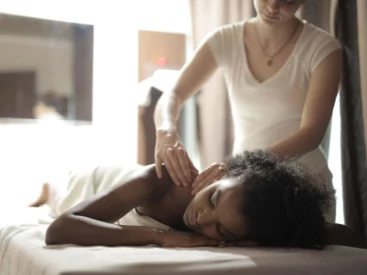Anxiety is a common feeling that can affect anyone, and it can be challenging to manage. When you’re anxious, your body responds with a fight or flight response, which can make it challenging to relax. However, learning to relax your mind and body is essential for managing anxiety. In this article, we’ll explore some tips on how to relax your mind and body from anxiety.
Practice deep breathing
Deep breathing is a simple but effective way to relax your mind and body. When you take deep breaths, you send a signal to your brain to calm down, which can help reduce anxiety. To practice deep breathing, sit or lie down in a quiet place and breathe in slowly through your nose. Hold your breath for a few seconds, then exhale slowly through your mouth. Repeat this process for a few minutes, focusing on your breath and letting go of any thoughts or worries.
Try progressive muscle relaxation
Progressive muscle relaxation is another technique that can help you relax your mind and body. This technique involves tensing and then relaxing each muscle group in your body, one at a time. By doing so, you can release tension in your muscles and calm your mind. To try progressive muscle relaxation, sit or lie down in a comfortable position and start by tensing the muscles in your toes. Hold the tension for a few seconds, then release and relax the muscles. Move up your body, tensing and relaxing each muscle group, until you reach your head.
Practice mindfulness meditation
Mindfulness meditation is a type of meditation that focuses on being present in the moment and accepting your thoughts and feelings without judgment. This technique can help reduce anxiety by bringing your attention to the present moment and allowing you to let go of worries and distractions. To practice mindfulness meditation, sit or lie down in a quiet place and focus on your breath. When your mind wanders, gently bring your attention back to your breath without judging yourself.
Get regular exercise
Regular exercise is an excellent way to relieve stress and anxiety. Exercise releases endorphins, which are feel-good chemicals that can help improve your mood and reduce anxiety. It can also help you release tension in your body and sleep better, which can further reduce anxiety. Aim to get at least 30 minutes of moderate exercise, such as brisk walking, cycling, or swimming, most days of the week.
Take scheduled breaks
If you’re feeling anxious, taking a break can help you relax your mind and body. Taking a break can mean different things for different people, but it might involve stepping away from work, spending time in nature, or engaging in a hobby you enjoy. Whatever your preferred way of taking a break is, make sure you give yourself permission to do so regularly.
Practice self-care
Self-care is essential for managing anxiety. It can include activities such as taking a warm bath, listening to music, or reading a book. Self-care also means taking care of your physical health by eating a balanced diet, getting enough sleep, and avoiding excessive alcohol and caffeine consumption.
Seek support
If you are struggling with anxiety, it’s essential to seek support. This can involve talking to a friend, family member, or mental health professional.
Sharing your thoughts and feelings with someone you trust can help you feel less alone and overwhelmed. A mental health professional can also provide you with tools and strategies to manage your anxiety and help you develop a plan to reduce your symptoms.
Moving forward
Stress and anxiety can be challenging to manage, but learning to relax your mind and body can be helpful in reducing symptoms.
By practicing techniques such as deep breathing, progressive muscle relaxation, and mindfulness meditation, getting regular exercise, taking breaks, practicing self-care, and seeking support, you can learn to manage your anxiety and improve your overall well-being.



